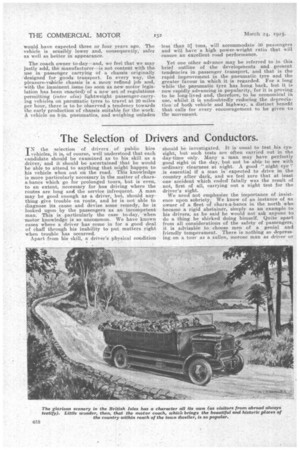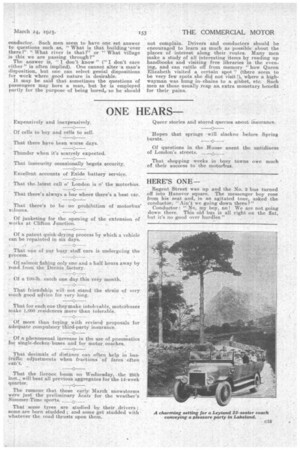The Selection of Drivers and Conductors.
Page 2

Page 3

If you've noticed an error in this article please click here to report it so we can fix it.
TN the selection of drivers of public hire _L vehicles, it is, of course, well understood that each candidate should be examined as to his skill as a driver, and it should be ascertained that he would be able to attend to anything that might happen to his vehicle when out on the road. This knowledge is more particularly necessary in the matter of charsa-bancs which go for prolonged tours, but is even, to an extent, necessary for bus driving where the routes are long and the service infrequent. A man may be good enough as a driver, but, should anything give trouble en route, and he is not able to diagnose its cause and devise some remedy, he is looked upon by the passengers as an incompetent man. This is particularly the case to-day, when motor knowledge is so uncommon. We have known cases where a driver has come in for a good deal of chaff through his inability to put matters right when trouble has occurred.
Apart from his skill, a' driver's physical condition should be investigated. It is usual to test. his eyesight, but such tests are often carried out• in the day-time only. Many a man may have perfectly good sight in the day, but not be able to see with ordinary clearness at night. A good "night eye '-' is essential if a man is expected to drive in the country after dark, and we feel sure that at least one accident which ended fatally was the result of not, first of all, carrying out a night test for the driver's sight. We need not emphasize the importance of insistence upon sobriety. We know of an instance of an owner of a fleet ot chars-a-bancs in the north who became a rigid abstainer, simply as an example to his drivers, as he said he would not ask anyone to do a thing he shirked doing himself. Quite apart from all considerations of the safety of passengers, it is advisable to, choose men of a genial and friendly temperament. There is nothing so depressing on a tour as a sullen, morose man as driver or conductor. Such men seem to have one set answer to questions such as, "What is that building 'over there?" " What river is that?" or " What village is this we are passing through?" The answer is, " I don't know" I don't care either" is often implied). One cannot alter a man's disposition, but one can select genial dispositions for work where good nature is desirable. It may be said that sometimes the questions of passengers may bore a man, but he is employed partly for the purpose of being bored,. so he should not complain. Drivers and conductors should be encouraged to learn as much as possible about the places of interest along their routes. Many men make a study of all interesting. items by reading up handbooks and visiting free libraries in the evening, and can rattle off from memory " how Queen Elizabeth visited a certain spot " (there seem to be very few spots she did not visit!), where a highwayman was hung inchains to a gibbet, etc. Such men as these usually reap an extra monetary benefit for their pains.
























































